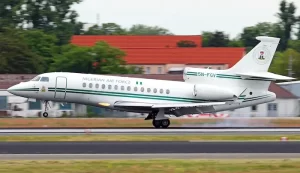Presidency Responds as French Court Orders Seizure of Three Nigerian Presidential Jets

Presidency Responds as French Court Orders Seizure of Three Nigerian Presidential Jets

Presidency Responds as French Court Orders Seizure of Three Nigerian Presidential Jets
The Presidency of Nigeria has responded to reports that a French court has ordered the seizure of three Nigerian presidential jets in connection with a longstanding legal dispute. The development, which has sent shockwaves through diplomatic and political circles, marks a significant escalation in a legal battle that has been ongoing for years.
The legal battle stems from a contract dispute between the Nigerian government and a foreign entity, Process and Industrial Developments Limited (P&ID). The case, which has been in and out of courts across different jurisdictions, concerns a failed gas processing project dating back to 2010. P&ID had entered into an agreement with the Nigerian government to build a gas processing plant, but the project never materialized, leading to a $9.6 billion arbitration award in favor of P&ID in 2017.
The Nigerian government has consistently maintained that the contract was fraudulently procured and has been engaged in a series of legal actions to overturn the arbitration award. Despite these efforts, P&ID has pursued enforcement of the award in various courts around the world, leading to the recent decision by a French court to order the seizure of Nigerian assets, including the presidential jets.
On August 14, 2024, the French Court of Appeal in Paris issued an order for the seizure of three aircraft belonging to the Nigerian government. The jets, which form part of the presidential fleet, are used for official travel by the President of Nigeria, Bola Ahmed Tinubu, and other top government officials.
The court’s decision has sparked concerns about Nigeria’s sovereign immunity and the potential impact on the country’s diplomatic and political standing. Legal experts have pointed out that the seizure of assets belonging to a sovereign state is an extraordinary measure, typically reserved for cases involving significant breaches of international law or contractual obligations.
In a statement released by the Senior Special Assistant to the President on Media and Publicity, Ajuri Ngelale, the Nigerian government expressed its strong objection to the French court’s decision, describing it as an overreach of judicial authority and a violation of Nigeria’s sovereign rights.
“The Federal Republic of Nigeria strongly condemns the decision of the French Court of Appeal to order the seizure of our presidential aircraft. This decision is not only an affront to our sovereignty but also a gross miscarriage of justice,” Ngelale stated. “We are currently exploring all legal options to challenge this ruling and ensure that our assets are protected.”
Ngelale further emphasized that the Nigerian government remains committed to defending its interests and will not be intimidated by what it sees as an attempt to undermine the country’s sovereignty.
“The Nigerian government will take all necessary steps to safeguard our national assets and ensure that justice is served. We call on the international community to support us in upholding the principles of justice and respect for sovereign nations.”
The seizure of Nigerian presidential jets in France has the potential to strain diplomatic relations between Nigeria and France. While the French government has not yet commented on the court’s decision, the Nigerian Ministry of Foreign Affairs is expected to engage in discussions with French authorities to seek a resolution.
In addition to the legal and diplomatic challenges, the seizure could have significant implications for Nigeria’s international reputation. The situation raises questions about the enforcement of international arbitration awards and the extent to which sovereign assets can be targeted in such disputes.
The Nigerian government has indicated that it will pursue legal recourse to overturn the French court’s decision. This may involve filing an appeal or seeking a stay of execution to prevent the enforcement of the asset seizure.
Legal analysts have suggested that Nigeria could also explore diplomatic channels to resolve the issue, potentially involving the United Nations or other international bodies. The complexity of the case, combined with the high stakes involved, means that the legal battle is likely to continue for some time.
The news of the court order has generated significant attention both within Nigeria and internationally. Political commentators have expressed concern about the potential impact on Nigeria’s governance, given the critical role that the presidential jets play in facilitating the movement of the President and other senior officials.
Opposition parties in Nigeria have seized on the development to criticize the government’s handling of the P&ID case, arguing that the situation reflects broader issues of mismanagement and corruption.
Internationally, the case has attracted interest due to its implications for the enforcement of arbitration awards and the protection of sovereign assets. Legal experts and diplomats alike will be closely watching how the situation unfolds and what precedent it may set for future disputes.
As the Nigerian government prepares to challenge the French court’s decision, the focus will be on safeguarding national assets and protecting the country’s sovereignty. The case underscores the complexities of international legal disputes and the potential consequences of arbitration rulings.
For now, the Nigerian government remains resolute in its defense against what it views as an unjust decision. As the situation develops, the Nigerian people and the international community will be keenly observing the next steps in this high-stakes legal battle.
Do you find Tmaq Media useful? Click here to give us five stars rating!



















